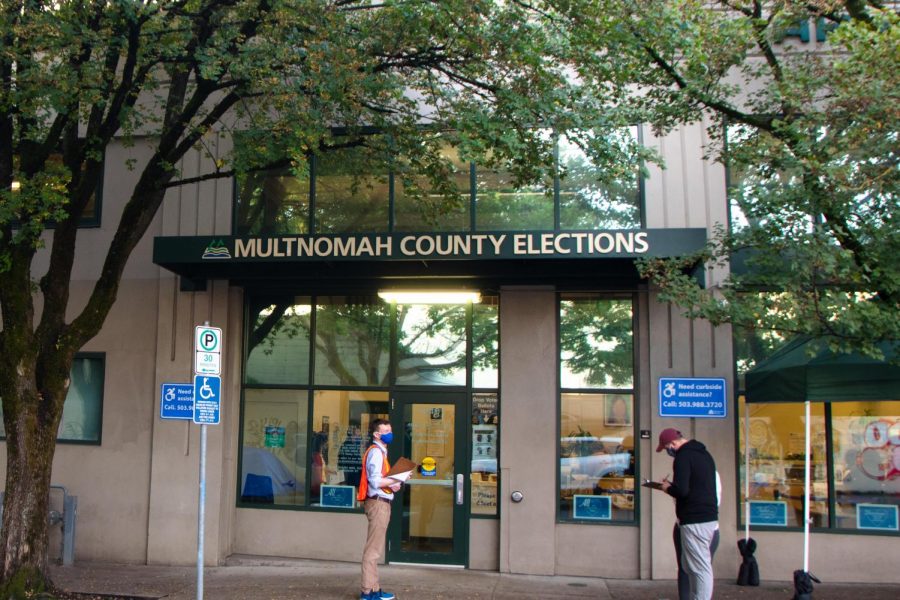The Two-Party System Is Tearing Us Apart
As the election draws nearer, voters again find themselves faced with a decision between two options, with no other realistic choices.
October 28, 2020
As Americans look toward an election that is just days away, some people feel that they are forced into a lesser-of-two-evils situation, and I find myself inclined to agree with them.
Some may argue that one is worse than the other, but that proves my point.
I’m not about to argue who is worse. That isn’t what this article is going to be about. Instead, I’m going to address the political two-party system that has caused the American people to be limited in choice.
The reality of the United States is that we have a two-party system. This, of course, isn’t in writing, but it’s the way our system and laws work — they actively prevent and discourage third parties.
Third parties have a massive disadvantage against the Democratic and Republican parties. They have little to no chance at winning elections, but they do still impact our government system.
Years ago, the most successful third party to exist was the Republican Party, which took the spotlight alongside the Democratic Party under Abraham Lincoln, who was the first and last president elected as a third-party candidate. Prior to this, the Whig Party and the Democratic Party were the primary two parties.
Now, third parties are smaller and different in influence compared to the Republican and Democratic parties. They function in the United States by bringing light to issues that the other two parties are ignoring, which is what the Republican Party did with addressing slavery.
It’s important to note for historical accuracy that the Republican Party’s platform was not built on immediately stopping slavery. However, Lincoln did believe that slavery was a great evil and believed that the U.S. would eventually have to either legalize slavery everywhere or make it illegal everywhere, personally preferring the latter.
In context to the civil war, though Lincoln’s top priority was saving the union, he wrote a letter that said, “If I could save the Union without freeing any slave I would do it, and if I could save it by freeing all the slaves I would do it; and if I could save it by freeing some and leaving others alone I would also do that. What I do about slavery, and the colored race, I do because I believe it helps to save the Union.” Therefore, it could be said that the topic of slavery wasn’t a priority for Lincoln.
Third parties act as a spotlight when issues are purposely excluded from national debate by both the Democratic and Republican parties, who don’t want to deal with the criticism that a topic might generate.
Often, when third parties bring attention to issues that are ignored, Democrats or Republicans will adopt the voter base of the third party in attempts to pull in more support.
Senator Bernie Sanders and Representative Alexandria Ocasico-Cortez are current examples of third party candidates who are conforming to the Democratic Party because although they identify as Democratic Socialists, they would use the Democratic Party’s platform to get elected.
So, would reformation of this system be beneficial? Is it fair that third party candidates have to campaign against a political system that only ever benefits Republican and Democratic politicians?
It’s important to understand that the American people are currently manipulated by both parties, as voters have no choice but to choose one of only two sides to even have an effect on who wins elections.
It’s time for us to realize that our current political system thrives off of broken motives.
The Democrats and Republicans want the American people to believe that voting anything other than Democrat or Republican is a waste because that mindset keeps them in power, when in reality, Americans agree far more than we disagree when it comes to political issues.
For example, 40 percent of adults self identify as independents, which shows that most voters have a similar political ideology, seemingly doing away with the fact that America is politically divided. Also, it’s important to note the two words “self identify,” and that this does not mean that 40 percent of adults are registered as independents.
Only 45 percent of Democrats think that decriminalizing the border is a good idea, while 54 percent of Republicans believe that illegal immigrants that are already in the U.S. should be allowed to stay here. Both of these statistics seem to conflict with what the parties are pushing for and also contradict what the parties have been saying about one another.
Although both of these examples don’t mean that the American people agree about all of the details of political issues, they show that we at least have some common beliefs, which holds us together in a system that is trying to tear us apart.
There is truth to the idea that voting for a third party is a waste, but most people don’t think critically as to why that is.
As our system stands today, both Democratic and Republican politicians put laws into place that actively prevent third parties from gaining necessary traction and support from the American people so that they can keep their power.
If you didn’t notice, no third party candidate has participated in a debate in 28 years. This is due to the fact that under the rules of Commission on Presidential Debates, anyone who doesn’t have at least 15 percent of the nation’s poll voters can’t participate.
The last time a third party did participate in a debate was in the 1992 presidential election, which featured George H. W. Bush and Bill Clinton. After participating in these debates, the third party candidate Ross Perot earned 19 percent of the nation’s vote in the actual presidential election.
This is considered the most successful turnout for a third party candidate during modern times, and emphasizes the importance of third party voices being heard by the American people.
Another issue is that most people have little to no knowledge about who the third party candidates are, so in national polls, the American people will most likely vote for the candidates running from the two mainstream parties.
In addition to this, third party candidates struggle to pull voters in, as they are almost always excluded from the highly televised presidential debates.
A law that actively suppresses third parties is the minor party vs. major party law.
The basis of this law varies from state to state, but for the most part, it has to do with the percentage of people who are registered for a certain party or the number of votes a party gets in a given election.
For example, in order to be considered a major party in Oregon, a party must get 5 percent of Oregonians to register for that party. To be a minor party, they must get 1 percent of the state’s vote in any given election.
Although 5 percent may not seem like a lot, to put it into perspective, the only third party to achieve major party status in multiple states is the independent party.
The reason for this is that most people register as a Democrat or Republican, and if a person doesn’t want to register with either party, they generally register as unaffiliated.
In many states, parties that are not considered major parties might not show up on the ballot at all. To vote for minor party members, voters must write them in, resulting in a much less likely chance of winning an election.
This can be attested because write-in candidates rarely ever win elections, and in the elections they have won, the candidates have already had a well-known political platform.
In addition to the major and minor party law, closed primaries also negatively affect third-party candidates and voters.
Closed primaries mean that voters have to be registered with a party in order to elect someone to run for a position. These closed primaries influence people to register with already established major parties.
The independent party is an example of this, as it has been on the brink of becoming a major party in Oregon for years, but recently, there has been a drop in the number of people registered as independent. It’s likely that many of those voters switched to parties that had a bigger platform and a chance to show up on the ballots.
The political system was built in order to keep third parties out, and still gives the Democratic and Republican parties an advantage over others. Third parties can’t succeed because they’ve never been given the chance or ability to.
The United States is one of the only developed countries that doesn’t have a multi-party system, and countries with multi-party systems actually have higher voter turnouts.
Implementing a system that doesn’t hinder third parties would give the American people more choices as to who they want in power, and would take away the guaranteed political power that the Democrats and Republicans currently hold.
It is no longer about what the American people want — it’s about how to maintain power.
Having a system that does not stifle third parties would break down power-rich politicians, making elections less predictable and more beneficial to the people. Additionally, voter turnout would likely increase, and we would have the ability to vote for the candidate we want, knowing that there is a chance that that candidate could actually win.
If we genuinely want our country to take steps in a better direction, it’s time to eliminate the laws that deliberately prevent third parties from having a voice and a seat at the table.





